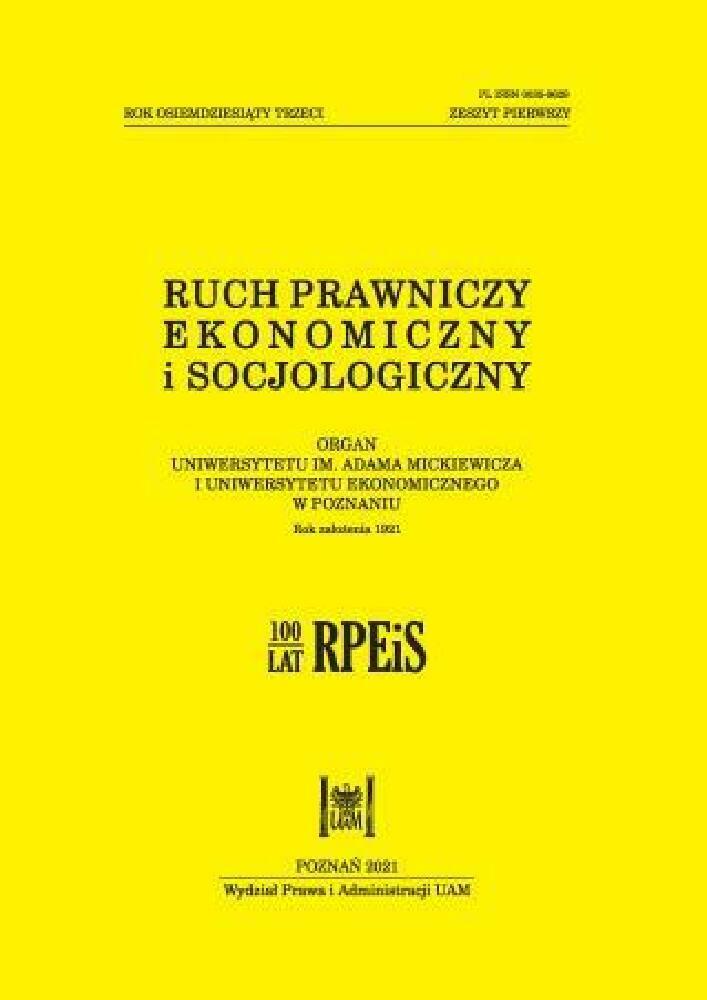Abstrakt
Automating administrative decision-making through the use of algorithms integrated into administrative procedures constitutes a major goal of both the Polish government and the EU. Notwithstanding the undeniable benefits of automated administrative decision-making, the tentative development of the law regulating administrative procedures in this regard translates into risks to important elements of administrative due process. Although a systematic regulatory approach to automated administrative decision-making is lacking, an analysis of the provisions of the GDPR concerning profiling algorithms and automated decision-making may prove rewarding, given that they may directly affect the procedural rights of parties in proceedings before national authorities. On the other hand, the imprecise language of the GDPR makes it susceptible to interpretations deeply embedded in the hitherto elaborated practices of the Polish administrative procedure. The article analyses the intersection between the GDPR and Polish administrative procedure in order to examine the potential for mutual influences between both frameworks.
Bibliografia
Adamiak, B. (2019). Komentarz do art. 77, [in:] B. Adamiak, J. Borkowski, Kodeks postępowania administracyjnego. Komentarz. Warsaw: Legalis.
Borkowski J., Krawczyk A. (2020). Postępowanie zwykłe. Przedmiot postępowania zwykłego, [in:] R. Hauser, Z. Niewiadomski, A. Wróbel (eds.), System prawa administracyjnego. Volume 9: Prawo procesowe administracyjne. Warsaw: 177–212.
Coglianese, C., Lehr, D. (2017). Regulating by robot: administrative decision making in the machine-learning era. Georgetown Law Journal 105: 1147–1223.
Craig, P. (2006). EU Administrative Law. Oxford.
Edwards, L., Veale, M. (2017). Slave to the algorithm? Why a ‘right to an explanation’ is probably not the remedy you are looking for. Duke Law & Technology Review 16(1): 18–84.
Gil González, E., De Hert, P. (2019). Understanding the legal provisions that allow processing and profiling of personal data – an analysis of GDPR provisions and principles. ERA Forum 19(4): 597–621.
Glibowski, K. (2020). Komentarz do art. 127, [in:] R. Hauser, M. Wierzbowski (eds.), Kodeks postępowania administracyjnego. Warsaw: Legalis.
Kaminski, M. (2019). The right to explanation, explained. Berkeley Technology Law Journal 34(1): 189–218.
Malgieri, G. (2019). Automated decision-making in the EU Member States: the right to explanation and other “suitable safeguards” in the national legislations. Computer Law & Security Review 35(5): 1–26.
Malgieri, G., Comandé, G. (2017). Why a right to legibility of automated decision-making exists in the general data protection regulation. International Data Privacy Law 7(4): 243–265.
Martini, M., Nink, D. (2017). Wenn Maschinen entscheiden… – vollautomatisierte Verwaltungsverfahren und der Persönlichkeitsschutz. Neue Zeitschrift für Verwaltungsrecht Extra 36(10): 1–14.
Mednis, A. (2019). Prawo ochrony danych osobowych wobec profilowania osób fizycznych. Wrocław.
Politou, E., Alepis, E., Patsakis, C. (2019). Profiling tax and financial behaviour with big data under the GDPR. Computer Law & Security Review 35(3): 306–329.
Selbst, A.D., Powles, J. (2017). Meaningful information and the right to explanation. International Data Privacy Law 7(4): 233–242.
Sibiga, G. (2019). Stosowanie technik informatycznych w postępowaniu administracyjnym ogólnym. Warsaw.
Wachter, S., Mittelstadt, B., Floridi, L. (2017). Why a right to explanation of automated decision-making does not exist in the General Data Protection Regulation. International Data Privacy Law 7(2): 76–99.
Wojciechowska, K. (2020). Komentarz do art. 9, [in:] R. Hauser, M. Wierzbowski (eds.) Kodeks postępowania administracyjnego. Warsaw: Legalis.
Yeung, K. (2019). Why Worry about decision-making by machine? [in:] K. Yeung, M. Lodge (eds.), Algorithmic Regulation. Oxford: 21–48.
Licencja
Prawa autorskie (c) 2021 WPiA UAM

Utwór dostępny jest na licencji Creative Commons Uznanie autorstwa – Użycie niekomercyjne – Bez utworów zależnych 4.0 Międzynarodowe.





